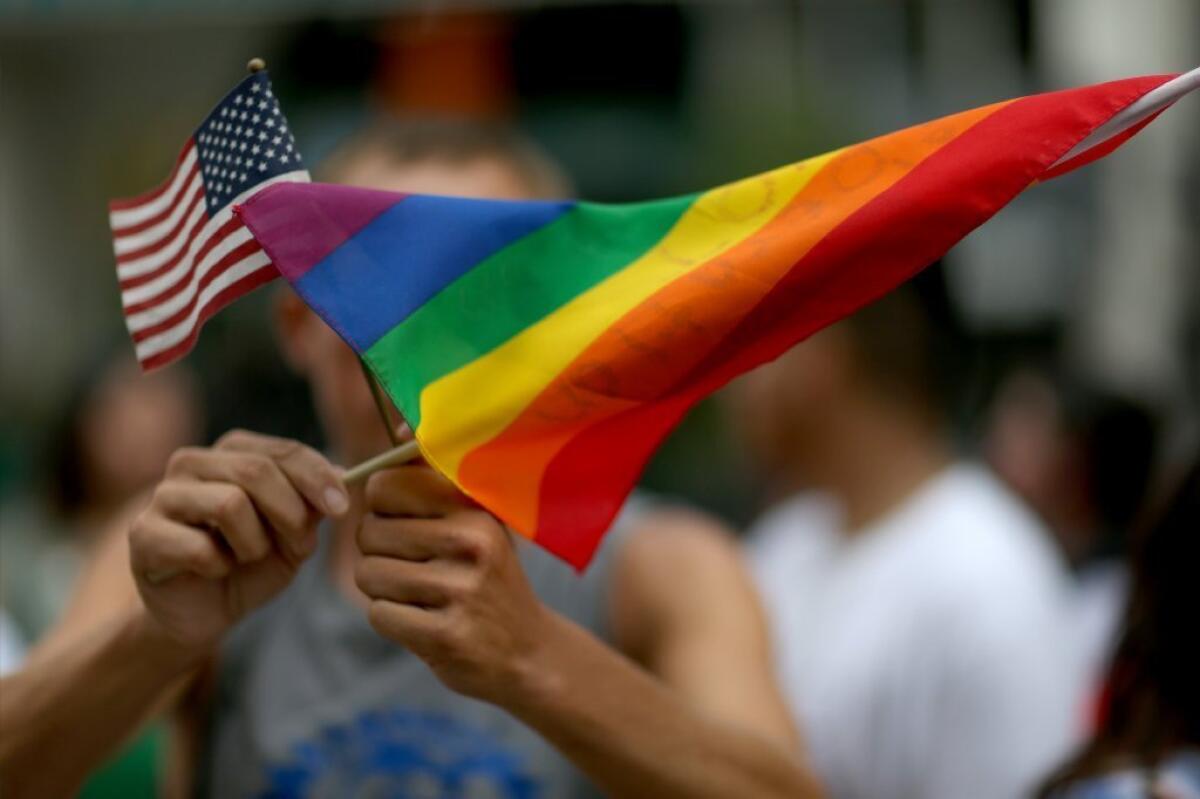Op-Ed: Trans community can change minds by changing discourse

- Share via
At a literary soiree in Paris, James Thurber was once told how much funnier his stories were in French. “Yes,” he replied sadly. “My works lose something in the original.”
I thought about this line when Laverne Cox, of the Netflix show “Orange Is the New Black,” was nominated for an Emmy, the first transgender person to achieve this honor in the acting category. This was just the latest success in what seems to be the Year of the Trans, a season of great progress in the movement for transgender equality. And yet commentators, both liberal and conservative, continue to struggle with the right words to describe the transgender experience.
Over the last decade, straight Americans have changed the way they think of and speak about gay and lesbian citizens. This is a result of, in part, the effect marriage equality has had on public discourse.
The best thing about same-sex marriage — now legal in 19 states, with more to come — is, of course, that gay men and women can get married. Love once forced to the outskirts of the American experience is now visible, celebrated, even mundane. With legal marriage has come other benefits, including nondiscrimination law, visitation rights and legal standing. All have had a transforming, beneficial effect on American culture.
But the advent of marriage equality has also had the effect of changing the language straight people use to describe gay men and women. Before the dawn of marriage equality, speaking about the gay experience for many straight people meant speaking about gay sex. It is fair to say that for some straight people, this conversation lacked a certain generosity.
Of course, there are plenty of individuals who still think and talk this way. Missing from their discourse are some of the other particulars of gay life — working at a job, or making a nice risotto, or raising one’s children.
If I were to broach this topic with the members of my conservative mother’s bridge group, I can assure you they might find a discussion of gay sex somewhat awkward. But every last one of them would come out as pro-love, as pro-family.
It’s this change that has altered the discourse, and thus the quality of life, for America’s gay men and women. The question of what people do in the privacy of their own bedrooms has, rightly, receded from the conversation. What’s front and center now is every man and woman’s right to love and be loved.
But for transgender people, that discourse is still a work in progress.
The feeling of being ill-matched to one’s sex is less common, and it is harder for some folks to get their minds around. The great challenge for many transgender people is that the all-encompassing trouble that can be at the center of our experience is something that has never even remotely been a problem for most straight people. Being shipwrecked in the wrong body is such a curious concept that the idea of this dilemma being a life-and-death issue for other human beings seems impossible, bizarre, even laughable.
The fact that many nontrans people have never experienced gender dysphoria is offered as proof that it therefore must not exist, in the same way that straight people once dismissed gay humanity because they had never experienced any same-sex desire themselves.
What the trans community needs is its own discourse-changing idiom, in the same way that gay men and women found their lives transformed when the conversation changed from sex to love.
I’d suggest we use the term “equality of identity” going forward. At its heart, the quest that trans people are on is to have the same thing that straight — and gay — people have: the ability to wake up in the morning and be ourselves, without permission, without apology. Our lives should not be defined by wigs, or surgery, or which bathroom we use. Our lives should be defined by our identities, and the truth we bear in our hearts.
At Colby College, where I taught for 12 years as a man and 13 years as a woman, I can tell you that my students were generally unconcerned about the nature of my labia. More urgent for them was whether I could help them with their writing, whether I could bring them insights into a work of fiction, whether I had something to teach them that would improve their lives.
On the whole, my role as a professor was mostly the same, whether I was male or female, except that as a woman I felt I was teaching from a position of authenticity and truth, rather than as someone pretending to be someone I was not.
I did have one student, many years ago, who had experienced me as both a male and a female professor, and he said he thought he learned more from me as a woman. “It wasn’t that the things you taught me changed,” he said. “It’s just that as a man you always seemed a little remote, like you were standing behind a piece of glass.”
Yes, I thought. I did lose something in the original.
Jennifer Finney Boylan, the national co-chair of GLAAD, is a professor of English at Barnard College of Columbia University.
Follow the Opinion section on Twitter @latimesopinion
More to Read
Sign up for Essential California
The most important California stories and recommendations in your inbox every morning.
You may occasionally receive promotional content from the Los Angeles Times.













